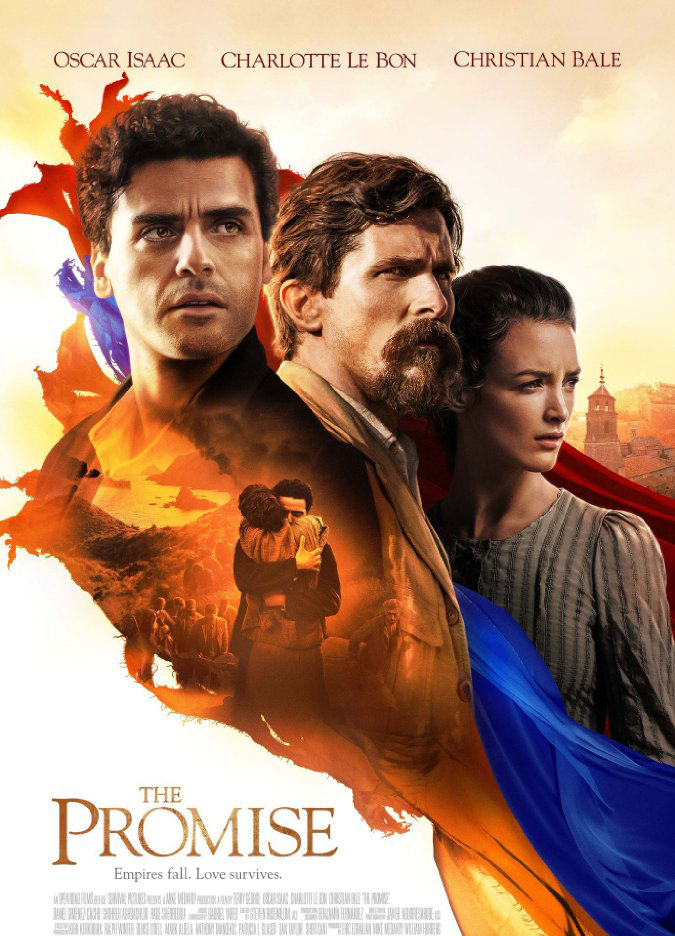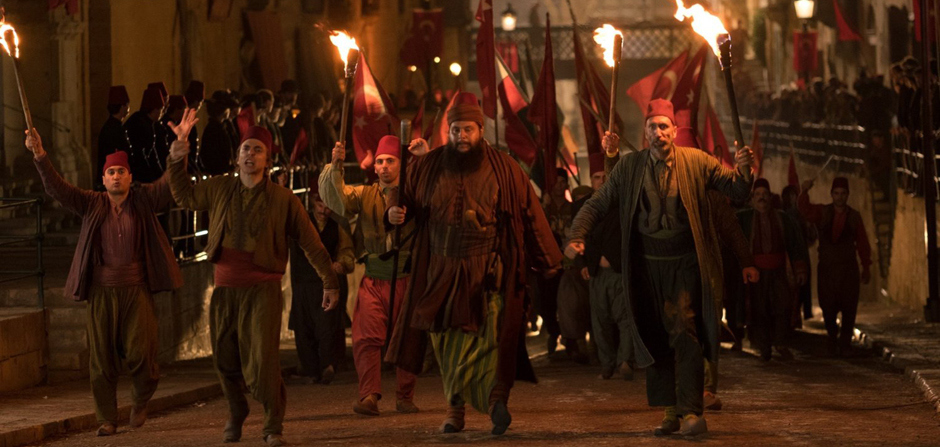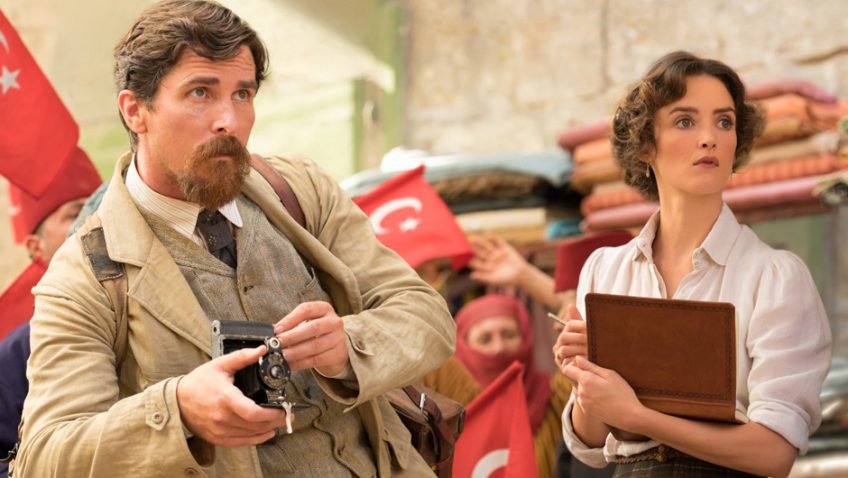Joyce Glasser reviews The Promise (April 28, 2017)
Beginning in 1915 in Constantinople, the Armenian Genocide was the beleaguered Ottoman Empire’s systematic extermination of an estimated 1.5 million Christian citizens, most of whom were Armenian. There have been dozens of good and several great films about World War II’s famous genocide, the Holocaust, but the Armenian Genocide of World War I has yet to be acknowledged by the Turkish government, let alone highlighted at Academy Awards. The Egyptian/Canadian filmmaker Atom Agoyan tried, with his 2002 historical drama Ararat, but it was a box office flop. The masterful filmmaker Fatih Akın, a German of Armenian descent, also tried with his sprawling, metaphorical saga The Cut in 2014, and failed even to find distribution. Does The Promise hold the promise of a film strong enough to combat a century of Turkish denial?
 A betting person might put their money on it. The millionaire property tycoon and philanthropist Kirk Kerkorian (who died at age 98 during production), a Californian with Armenian roots, was the force behind an $90 million budget. Moreover, the producers brought in 65-year-old Irish writer/director Terry George, the king of ‘injustice’ films, who garnered 7 Academy Award nominations with Guildford Four film, In the Name of the Father and three more for his superb film about the Tutsi genocide at the hands of the Hutu in Hotel Rwanda. The American Film Institute have placed Hotel Rwanda on their list of the 100 most inspirational movies of all time, which is just what the Armenian Genocide film needed. Two handsome, powerhouse movie stars, Oscar Isaac (Inside Llewyn Davis) and Christian Bale (The Dark Knight, The Fighter), would not do the cause any harm either.
A betting person might put their money on it. The millionaire property tycoon and philanthropist Kirk Kerkorian (who died at age 98 during production), a Californian with Armenian roots, was the force behind an $90 million budget. Moreover, the producers brought in 65-year-old Irish writer/director Terry George, the king of ‘injustice’ films, who garnered 7 Academy Award nominations with Guildford Four film, In the Name of the Father and three more for his superb film about the Tutsi genocide at the hands of the Hutu in Hotel Rwanda. The American Film Institute have placed Hotel Rwanda on their list of the 100 most inspirational movies of all time, which is just what the Armenian Genocide film needed. Two handsome, powerhouse movie stars, Oscar Isaac (Inside Llewyn Davis) and Christian Bale (The Dark Knight, The Fighter), would not do the cause any harm either.
But both In the Name of the Father and Hotel Rwanda, dubbed the African Schindler’s list, were based on true stories, focused on a real heroes and had absorbing scripts.
In The Promise, the usual dramatic licence all filmmakers take in adapting true stories to the screen becomes a full blown travesty in which fact and fiction is irresponsibly fused. To make matters worse, George, who co-wrote the script with Robin Swicord (The Curious Case of Benjamin Button), seems to have been pushed into writing a didactic script in which the genocide is eclipsed by a tacky love triangle.
Mikael (Isaac) works as apothecary in Sirun, an Armenian village in the former Ottoman Empire, but he is ambitious – in the right way, of course – and wants to become a doctor. Since he is an eligible bachelor, he becomes engaged to an attractive and good natured neighbour’s daughter, Maral (Angela Sarafyan) in exchange for a dowry that will pay for his medical training. Mikael makes a promise to his bride to return and marry her when he becomes a doctor.
Conveniently, Mikael has a wealthy, generous uncle who lives in a palace right on the Bosporus. Mikael is equally impressed with the uncle’s tutor, a pretty, svelte young Armenian woman, Ana (Charlotte Le Bon), the tutor to the Uncle’s young children. No excuse is made for Isaac’s accent when he curiously speaks in English with his Armenian relatives, but since the somewhat annoying actress Charlotte Le Bon (The 100 Foot Journey) is French, she is given a back story that nearly justifies her slight French accent – when speaking in English.
Christian Bale is spared the phoney accent, for he is Chris Myers, an American journalist with Associated Press, when Associated Press had a seemingly unlimited budget. Chris has been living in a hotel in Constantinople since the outbreak of WWI and does not even speak the language.
The personable, courageous Chris and the sophisticated, intelligent orphan Ana are an item, however, and though Mikael is engaged, it is clear he is a tad jealous. Fortunately, he has his medical studies to distract him until they are interrupted by political events when all Armenian men are drafted into the Ottoman army. With the help of a medical student colleague, Emre (Marwan Kenzari) the dashing, westernized son of a powerful Turkish military leader, Mikael obtains an exemption.
Mikael and Ana are literally thrown together for the night when, on April 24, 1915, they decide to go to the movies. Unfortunately, that is also the night the authorities decide to begin the genocide by rounding up nearly 300 Armenian leaders and intellectuals (most of whom are then murdered). Ana and MIkael escape the carnage in a small hotel where they make love.
When Mikael returns to his uncle’s home he learns that he has been arrested. While attempting to save him, Mikael is arrested and sent to a labour camp. From here the story expands to biblical proportions, as Mikael and Chris bear witness to the atrocities, which literally hit home when Mikael returns to Sirun. Ana pops up everywhere like Eva Marie Saint in Otto Preminger’s Exodus, to ensure that the love triangle continues to boil. But the pop up prize goes to Chris Myers who not only reports objectively, but intervenes to save the displaced Armenian refugees.
While Mikael, Ana and Chris Myers are fictional characters, a character who helps save Chris from a death sentence, the American Ambassador Morgenthau did indeed exist. Morgenthau, an Ashkenazi Jew who spoke out against the genocide throughout the war, is well played by James Cromwell. But he disappears quickly so that we can return to the flight of the refugees, who now include Mikael and Ana. Chris has resigned the fact that Ana (for reasons we will never know) prefers Mikael, but he is too manly to hold a grudge – and too busy. Chris is somehow found on board the real life French cruiser Guichen, where he persuades the Captain (a cameo from Jean Reno) to switch course to help save the refugees rushing to the shore with the Ottoman army at their heels.
While it is very difficult to take this film seriously, it is also difficult to dismiss the horrors of the genocide it depicts as accurately as a movie can. And that makes it more difficult to excuse the filmmakers for using it as the convenient backdrop for a made up, lackluster love story.
You can watch the film trailer here:




